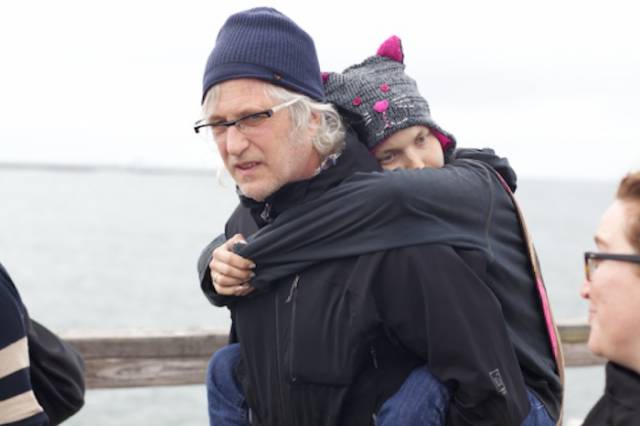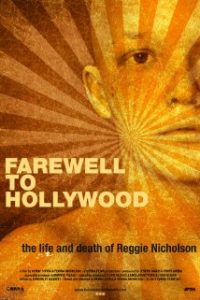
 From the beginning, Farewell to Hollywood filmmaker Henry Corra knew that his collaborator, and subject, Regina “Reggie” Nicholson would be dead by the time they completed the film. Recently diagnosed with terminal cancer, the teenage girl had one last wish: to make a film about her life. The resulting work is one of the most harrowing non-fiction films ever made; a film that will surely offend, shock and bother some, while others will find themselves transfixed with its boundary-pushing aesthetics and its unique, liberating nihilism. It’s take no prisoners filmmaking the likes of which is rarely seen nowadays.
From the beginning, Farewell to Hollywood filmmaker Henry Corra knew that his collaborator, and subject, Regina “Reggie” Nicholson would be dead by the time they completed the film. Recently diagnosed with terminal cancer, the teenage girl had one last wish: to make a film about her life. The resulting work is one of the most harrowing non-fiction films ever made; a film that will surely offend, shock and bother some, while others will find themselves transfixed with its boundary-pushing aesthetics and its unique, liberating nihilism. It’s take no prisoners filmmaking the likes of which is rarely seen nowadays.
The film has been making the festival rounds for more than a year now and has been received with critical acclaim, as well as some controversy. If anything Farewell to Hollywood is the kind of film you simply don’t forget. We had the opportunity to talk to Corra who elaborated on the film’s themes, the complexity of the title and even shared some stories about how his career began.
As a New Yorker how was it to make your film in California?
That’s an interesting question, because there is sort of a quadruple meaning to the title of the movie, one of them being that it’s me finally going back to New York, saying goodbye to Hollywood (laughs) After this devastating ordeal of making this film with Reggie, in the summer of 2012 I finally drove back to Manhattan, living in LA because of the circumstances, of being involved with a young woman with a terminal disease, and for half of that time being her primary caregiver was a mad panic. I don’t think it was an accurate LA experience. Farewell to Hollywood was kind of like a high anxiety mixed with a fairy tale and the surfing of the freeways.
I felt t here were many Lynchian aspects to how you shot the film.
here were many Lynchian aspects to how you shot the film.
No one has ever said that before, but that’s the greatest compliment you could ever give me, because I think Mulholland Dr. and Farewell to Hollywood - for personal reasons - are the two movies that after I watch them leave me physically devastated for about two days.
I also felt the title of your film was about saying goodbye to the artifice of Hollywood and facing real life.
Exactly, that’s one of the many meanings, we have more meanings every day.
I’m curious about what that film festival where you met Reggie was like.
It used to be called Silverdocs, now it’s called AFIDOCS, it’s the biggest non-fiction film festival in the United States. My last film was called The Disappearance of McGinley Nolan and we were the centerpiece of the 2010 festival, so after the premiere we were back at the hotel and I met Reggie and her mother. Reggie had a film in the youth competition, so that’s how we met.
You bonded with her through your love of film, is this usually how you bond with people?
That’s a big question, I came from the Maysles brothers, I went to an art school in New Hampshire and studied performing arts, I was really into the more avant garde that was going on, situational theater and that kind of thing, so that’s what drew me to New York. I saw Grey Gardens and I was so blown away by that movie, it was like a new kind of cinema, the moments when the brothers show themselves in the movie, and the relationship between the women...I saw something that connected filmmaking to the performing arts background that I had, so I knew I had to meet these people. I came to New York as soon as I graduated, I walked into their office next to Studio 54 and I was so naive. I went up to the brothers, told them I’d seen the movie and I’d do anything to work with them, so they looked at each other, looked at their watches and went “well, what are you doing today?” They hired me to check dubs of Grey Gardens and Edie’s mother had died, so she got her wish of living in NYC, so she’d always drop by the Maysles’ office, which I thought was the coolest thing in the world. She started calling me “the gentleman from Virginia”, so the Maysles had me “take her out” on a couple of dates because she was kind of a shut in - what they would call a hoarder nowadays, but shut in sounds more poetic - I took her to the Mudd Club to see some punk and introduced her to everybody, it was an all-girl punk band called the Ladies Auxiliary of the Lower East Side, and she was like “I just love show business”, but as long as the music started, it was all noise and loud music, so Edie turned to me and said “it’s horrible, let’s get out of here!”, so I took her home.
I like that you brought up Grey Gardens because like your film it touches on decay and death in a very open way.
You should give Reggie credit for that too, she was very involved in the editing and she asked me not to cut away. She was very adamant that we showed the suffering, as our bond grew stronger, she insisted that we filmed her dead body. Not for shock value, but because she wanted people to accept the fact that she was no longer suffering and she was in pain no more. It kinda goes back to when I first met her, we were in the lobby of that hotel talking about ways to collaborate, I told her I did unscripted reality, that the rules of my films were made on the way. She thought it was amazing and said it could work perfectly for her project. She pulled me to the side and asked “if we do this, are you OK with the fact that I’m going to die?”, I told her I could try to be and she said she needed to have someone who’d be OK with her dying, because other people around her didn’t talk about the inevitability of her death. So that was our pact from the beginning.
That’s really powerful.
I was terrified! I was always taught that you lean into your fears, all the kinds of parts I’ve been interested in have been about breaking down the barriers between fiction and reality, and in order to do that we have to lean into our fears. When Reggie was so brave and frank about what we could do together and how treacherous it would be, because it would end in death, I was terrified. We had no idea what would happen, we just knew we would make a film and it would be transformative.
I can see why some people would find the movie to be exploitative or controversial, but I found it to be quite moving in a way similar to Harold and Maude, which had people from very different walks of life bonding over something beyond age, romance, sex and other social constructs.
That’s a great one! You’re the perfect audience for this movie! Reggie would love you, she loved Harold and Maude. That’s what was so magical about the experience, we were very close platonic friends and collaborators. She was just beginning as an artist, smart as a whip - definitely the smartest person in the whole movie - she got the improvisational aspects and she created ideas and a film language out of it. We called the film a non-fiction fairy tale because the film became relief and magic, because everything else that could go wrong seemed to go wrong.
Would you say that documentary films are the most honest kinds of films then?
I don’t think Reggie and I were documentary filmmakers, we used reality, but we worked in an unscripted way. There’s a kind of magical, cinematic layer that bubbles up in this movie. I think what was most challenging to us was how to pace out the pain and the inevitability of the death. We kept wondering aloud, is pain actual pain when it’s in something like Terms of Endearment? Whatever happened to Debra Winger? (Laughs) In a weird way we had to create fantasy, because imagine how brutal it would have been without that escape into Hollywood.
Farewell to Hollywood is now playing in select theaters.